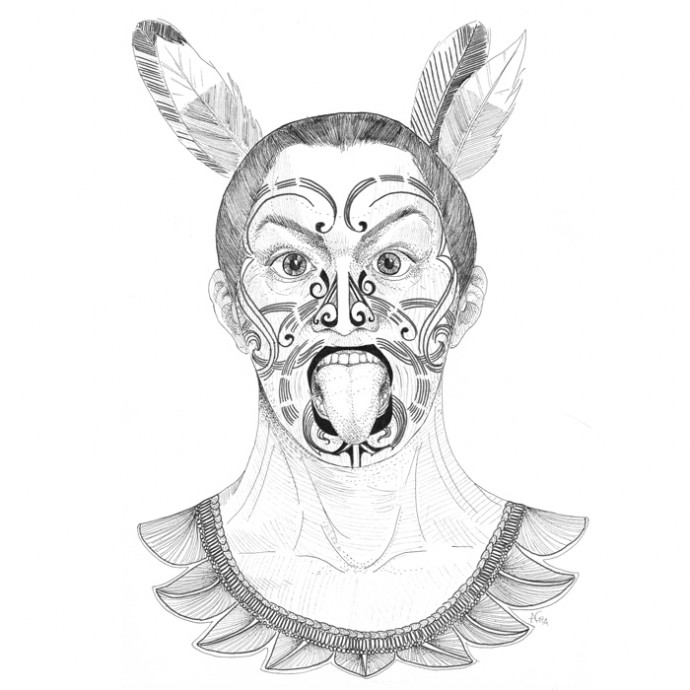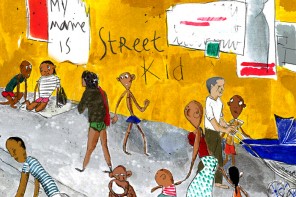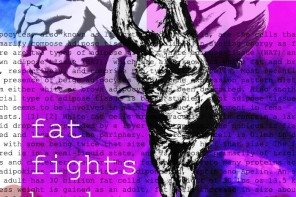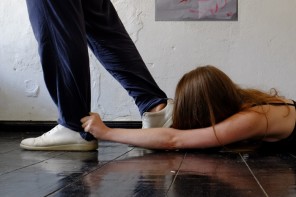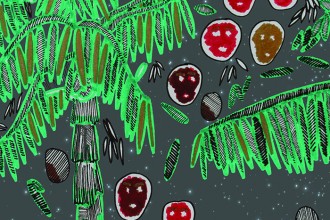Te Reo, the native tongue of the indigenous Māori people, is one of New Zealand’s official languages. However, less than 1% of the population can speak Te Reo fluently. Te Reo Māori was Wiremu Dijkstra’s first language, but when he started school he underwent a passive Anglicisation, during which he lost the ability to speak it. After two decades, he decided to make a concerted effort to re-learn Te Reo and get back in touch with the language and culture of his ancestors. Sensa Nostra spoke with Wiremu in order to find out what led him to do so, and where he sees Te Reo in New Zealand’s future.
Even though I look Māori, I was brought up pretty ‘white’. My mother spoke to me in Te Reo, so I guess it is my mother tongue, but my dad is Pākehā (New Zealand-European) and my parents separated, so I was never immersed in it. From about kindergarten on I was surrounded by English, and I never really thought about it. My mum had friends whose kids went to Māori schools, and they became bilingual, but I ended up speaking to my mum only in English. Everything was in English; the only time I felt Māori was when there would be token compulsory language classes in school. The teacher, who obviously didn’t speak Māori, would never ask the brown kids anything, in case they corrected him and embarrassed him. So even though I couldn’t even speak the language, I felt pretty Māori then.
Genetically, I’m about the same percentage Māori as I am Dutch, but because I’m brown then I’m automatically a ‘Māori’. I think that’s the same for most people; even if you’re one-tenth Māori you probably look Māori to other people. That’s the main reason why I associate with the culture, because I feel like other people associate me with it. But it has never made me feel ostracised. The good thing about New Zealand’s racism—well, if you can say it’s good—is that the main discrimination is only on paper. I don’t mean it’s great, but it could be worse. It’s mainly just a lot of positive discrimination that people gloss over, things like lower university entrance grades, and dick-loads of scholarships if you can show that you are something ridiculous like one 28th Māori. In real life, sure, I look brown, but it doesn’t alter how I live my life. I hang around with white or brown people, and it makes no difference. If anything, my appearance is a positive attribute in social situations. I don’t know why, but it’s easier to pull girls by playing the ethnic card. Especially foreign girls. You say a few bullshit words in Māori, stand beside a pasty white boy, and the bitches melt.
Living in Amsterdam made me think about culture. My grandfather is Dutch, so I wanted to try and get closer to this part of my heritage. But instead, my experience there changed how I saw Māori culture. Mostly because I realised that the Dutch language still has a country where it is spoken normally and doesn’t have to be promoted and protected against dying out. In fact, so many little European countries still have their own distinct language, and with it a history and culture attached, which is pretty cool. I’ve never been fiercely proud to be from New Zealand or tried to wave the flag in people’s faces, but I just think it’s sad that people and cultures can disappear.
It wasn’t like a flash of light or epiphany or anything. I didn’t feel lost all of a sudden, like I didn’t belong anywhere and didn’t have a culture. Actually, it was the opposite. It made me feel like I could belong anywhere. I’m as much Dutch as I am Māori, but obviously nobody has ever assumed that, and it has not had as much impact on how people relate to me than the colour of my skin has. It has always been a joke amongst my friends that I pretend to be so exotic, yet I can’t even say my own last name.
But that’s kind of how I see it: who cares what my name is or what language I speak? Deciding wholeheartedly to relearn Māori was a personal decision, but not one about rediscovering my heritage or anything like that. After living in Amsterdam I realised that my heritage meant fuck all—my name was Dutch, but I had no idea how to say anything or what to eat at Christmas. I decided I wanted to learn Māori, not just because of my family, but because anybody can learn it if they want. I knew a girl at uni who is white as fuck; her parents weren’t even from New Zealand, but they lived in a small town and she went to a Māori primary school, so now she speaks it better than me.
You don’t have to be Māori to be allowed to embrace Māori culture. It wasn’t something about personal or cultural pride; I just wanted to. I did a full-year immersion course, which is pretty rare and fucking challenging, to be honest. But now I speak fairly fluently, and I see things in different ways, so I’m glad I did it. Not that it’s ‘useful’ in itself. It’s not like learning a language so you can travel, like how to order a beer in Spanish. But there are so many things about the culture, and general Māori ideals and concepts, that can only really be understood once the language is. And some of these, like the notion of communal responsibility of land rather than private property, put our European ideals into pretty fucking sharp perspective.
So I think the only thing now is to shift people’s opinions so that they realise that it’s not a waste of time, but a means to expand people’s ideas, views and ways of thinking. It can be a personal thing for people to better themselves, like doing yoga or some shit. Some people think it’s a waste of time learning a dying language. But then as soon as they go overseas, those people are the first to claim the unique Māori culture and the Haka and perform some shit version of it pissed in a bar in London. Those are the times when I think that, if people do want to keep it, they should do it properly. In reality, that is probably wishful thinking. But I just want people to understand that as long as Māori culture and language are embraced, they should be respected. If you don’t want to embrace it, then you don’t have to respect it—that’s your prerogative—but I don’t think it’s healthy to be in the middle.
Despite everything, I think that the Māori language will always be around, at least in some form. Ka ngaro te reo ka ngaro te iwi—If the language is lost, so too will be the people. A lot of people know a few words, and for the most part awareness of Māori has improved and is handled quite well in the mainstream media. But overall it has largely been watered down by Pākehā culture, and only a few people actually think and act truly Māori. But that’s not a terrible thing. There is enough passion among these few for it to be maintained, and enough general awareness for a few others to see the worth in picking it up from there. Not just for saving an old, unsophisticated, marginalised savage culture, but for their own benefit.

